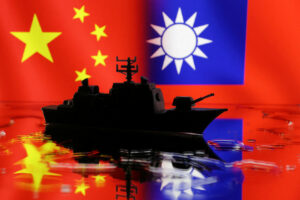
Taiwan has not increased military deployments on frontline islands — ministry
TAIPEI/KINMEN, Taiwan — Taiwan has not increased military deployments on frontline islands facing China and there is nothing unusual in the military situation around Taiwan, the defense ministry said on Wednesday amid a rise in tensions with Beijing.
Taiwan, which China claims as its own territory despite the island’s rejection, has been wary of efforts by Beijing to ramp up pressure on Taipei following last month’s election of Lai Ching-te as president, a man Beijing considers a dangerous separatist.
China’s coast guard on Sunday began regular patrols around the Taiwan-controlled Kinmen islands after two Chinese nationals died trying to flee Taiwan’s coast guard after their boat entered prohibited waters.
On Monday, China’s coast guard boarded a Taiwanese tourist boat in waters close to Kinmen, a move Taiwan denounced as causing “panic.”
Speaking at a regular news briefing in Taipei, Taiwan defense ministry intelligence office Huang Ming-chieh said there was currently “nothing abnormal” in China’s military movements around Taiwan.
Lee Chang-fu, deputy head of the ministry’s joint operations planning department, added that there was no increase in Taiwan’s deployments on the offshore islands, which also includes the Matsu archipelago further up the Chinese coast from Kinmen.
The ministry reiterated it will not intervene in the situation around Kinmen to avoid further escalation in tensions, but is making plans with the coast guard for possible “new scenarios.”
“Our navy and the defense forces of the offshore islands will conduct exercises and preparations in response to the situation,” said ministry spokesperson Sun Li-fang.
“The purpose is to hope that in the face of the overall threat situation, it can be effectively and properly handled.”
The US State Department on Tuesday said it was closely monitoring Beijing’s actions, urging restraint and no unilateral change to the status quo.
NEXT TO CHINA
Kinmen is a short boat ride from the Chinese cities of Xiamen and Quanzhou and has been controlled by Taipei since the defeated Republic of China government fled to Taiwan in 1949 after losing a civil war with Mao Zedong’s communists, who set up the People’s Republic of China.
Kinmen, where there was fierce fighting during the height of the Cold War but is now a popular tourist destination, is home to a large Taiwanese military garrison, but it is Taiwan’s coast guard which patrols its waters.
In Kinmen, home to around 100,000 people and where signs of previous fighting with China including old bunkers and the odd bullet-pocked buildings are plain to see, there have been no obvious signs of alarm.
“I think it’s an accidental occurrence, it’s not the norm, and it also should not become the norm,” said tourist Chen Yung-hung, 52.
Security sources in Taiwan have told Reuters they do not expect China to escalate the situation around Kinmen, but that it was likely part of Beijing’s increased pressure campaign ahead of president-elect Lai taking office in May.
Su Tzu-yun, a research fellow at Taiwan’s top military think tank, the Institute for National Defence and Security Research, said China’s use of the coast guard was an act of “relatively low intensity”.
“They have a two-handed strategy — on the one hand, putting political pressure on Taiwan, while on the other hand trying to avoid escalation,” he said.
Taiwan’s government rejects China’s sovereignty claims and says only Taiwan’s people can decide their future. — Reuters
